As an intensive R&D Company, Lincbiotech has received the support of several funding bodies:
O obxectivo principal destas axudas é o reforzo do crecemento sustentable e a competitividade das pemes e a creación de emprego nestas, tamén mediante investimentos produtivos.
O resultado que se pretende acadar é posta en marcha de proxectos de dixitalización cuxa finalidade sexa a implantación de solucións para o soporte dixital de procesos dunha empresa ou para proxectos de interconexión dixital de procesos entre unha empresa galega e outras empresas ou entre dúas ou máis empresas galegas.

Titulo: MARCADORES TEMPRANOS DE ALZHEIMER MEDIANTE LA COMBINACIÓN DE TÉCNICAS AVANZADAS DE IMAGEN Y DIAGNÓSTICO IN-VITRO
Expediente: IDI-20190798
Alzheimer’s disease (AD) stands as the primary contributor to dementia and the loss of independence in elderly individuals, characterized by a gradual decline in cognitive function and a reduction in social engagement. With the aging population in the European Union (EU) continuing to grow, the magnitude of this issue is expected to increase significantly in the coming decades. Currently, there is a lack of effective methods for early AD diagnosis, underscoring the urgent need for innovative diagnostic and therapeutic approaches to delay the onset of debilitating symptoms. To defeat this challenge, the ADMARKERS project bases its approach on the importance of tau oligomers in the early pathophysiological processes of AD. We have developed monoclonal antibodies (mAbs) with high affinity to certain species of tau oligomers implicated in the early onset of the disease.
Using these mAbs we develop several diagnostic methods:
Moreover, the diagnostic potential of these biomarkers will be assessed and validated during project implementation in clinical settings with samples obtained from a variety of patients suffering from different grades of dementia.
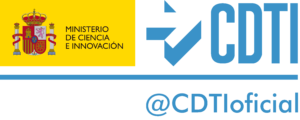 .
. 
“Análisis y desarrollo de Soluciones diagnósticas y terapéuticas de segunda generación frente a SARS -CoV-2 mediante la combinación de tecnologías biomoleculares y digitales. (BioTICfinder)”
El presente proyecto se marca como objetivo el desarrollo, a partir de aptámeros, de nuevas herramientas diagnósticas y terapéuticas frente al SARS-CoV-2 mediante la combinación de tecnologías químicas, de biología molecular y digitales.

Los objetivos de este proyecto son los siguientes:
En general, los objetivos de esta primera anualidad se han alcanzado de forma satisfactoria. En el ámbito diagnóstico hemos conseguido un número significativo de aptámeros optimizados, hemos seleccionado el diseño óptimo del lateral flow y hemos completado, con mucho adelanto, la adaptación del uso de los aptámeros a la detección, mediante un point-of-care, del SARS-CoV-2 en aguas residuales, con muy buenos resultados. En el ámbito teràpeutico, se ha iniciado en el diseño de los compuestos y en su análisis por RMN y finalmente éstos se han sintetizado y testados inicialmente in vitro con resultados preliminares muy positivos.
En el nivel diagnóstico, los principales resultados positivos de este proyecto han sido los siguientes:
En el nivel terapéutico los principales resultados de este proyecto han sido los siguientes:
Actividades de difusión:
Los participantes del consorcio BioTicfinder presentaron, junto a los otros proyectos financiados, los resultados obtenidos durante la ejecución de este proyecto financiado en la convocatoria Conecta Covid.
Conecta Covid es una línea de ayudas convocadas por la Axencia Galega de Innovación para proyectos de I+D+i relacionados con Covid-19 orientados al doble objetivo de afrontar la pandemia y contribuir a la transición digital de las empresas gallegas. Esta convocatoria está co-financiada por el Fondo Europeo de Desarrollo Regional (FEDER).
El pasado 20 de junio se realizó una jornada conjunta para divulgar los resultados de los 8 proyectos, constituidos por casi 30 entidades público-privadas.
Links de interés:
https://www.dihdatalife.com/proyectos-conecta-covid-jornada-de-presentacion-de-resultados/
https://www.youtube.com/watch?v=kbXlhh5-FfU&t=21s
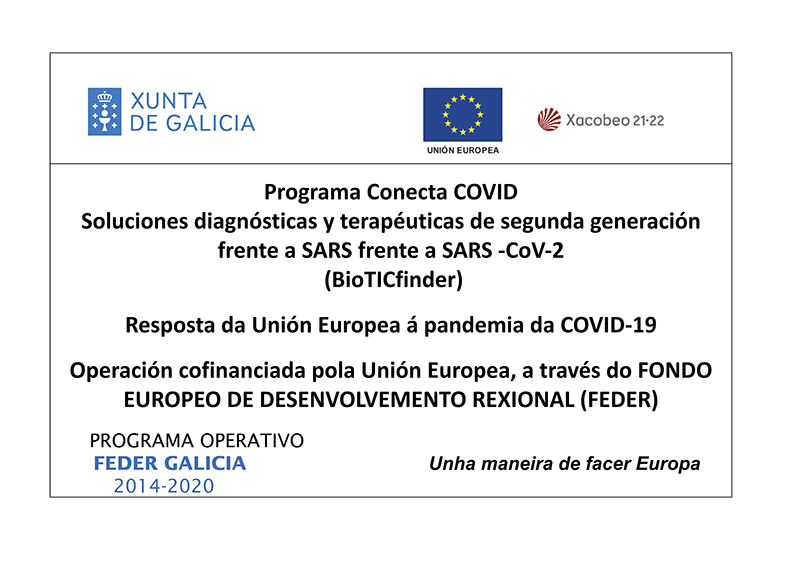
“IoT system for automatic detection of pathogens in water through artificial intelligence, biotechnology and nano SERS technology integration for the prevention and control of infectious outbreaks in aquaculture farms (SERSBIOTech)” aims to develop a new generation of ultrasensitive biosensors based on the combined use of nanochemistry, molecular recognition and bio-functionalization, in a lateral flow chromatography (LFA) system integrated in Raman scattering spectroscopy (SERS) software.
The research project is developed by the following consortium: SISTEMAS AUDIOVISUALES ITELSIS, SL (coordinator), LINCBIOTECH, GALICIAN MARINE AQUACULTURE SL (GMA), SOLUCIONES Y PROYECTOS DE INFORMACIÓN SL (SIXTEMA) and MESTRELAB RESEARCH SL, further supported by the two research institutions of the University of Vigo and CETGA.

The project is funded by the Axencia Galega de Innovación (GAIN), through the Conecta hubs program and co-financed by the European Regional Development Fund (ERDF) under the FEDER Galicia 2014-2020 operational program. It also has the support of the Vicepresidencia Segunda e Consellería de Economía, Empresa e Innovación.
The SERSBIOTech project proposes the development of a real-time detection system for pathogens in water through the development of a reliable biosensor for in situ and remote monitoring of infectious diseases of great relevance to the aquaculture industry. This system would cover the current need that exists in the sector for the development of new rapid and automated detection systems for the detection of pathogens.
General and technical objectives of the Project:
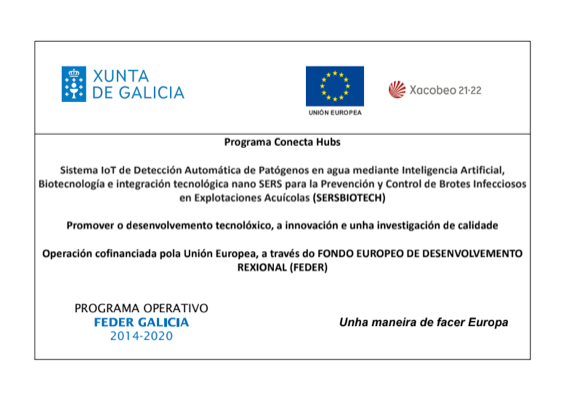
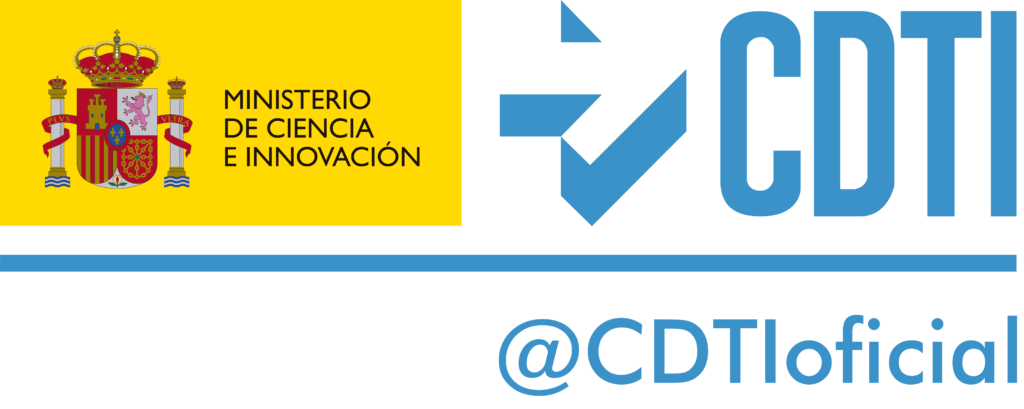 |
 |
FONDO EUROPEO |
Lincbiotech ha sido beneficiaria de una ayuda parcialmente reembolsable de hasta 195.758,03€ encuadrada dentro de la convocatoria 2020 de emergencia sanitaria “COVID-19” del CDTI, ayuda cofinanciada por el fondo europeo de desarrollo regional (FEDER) a través del programa operativo plurirregional de España 2014-2020. El proyecto tiene como objetivo principal desarrollar un kit de diagnóstico rápido del virus SARS-COV-2 en cromatografía de flujo lateral.
Referencia: IDI-20200506
Proyecto: “DESARROLLO DE UN KIT DE DIAGNÓSTICO RÁPIDO DEL VIRUS SARS-COV-2 BASADO EN CROMATOGRAFÍA DE FLUJO LATERAL”
Lincbiotech ha sido beneficiaria de la ayuda encuadrada dentro de la convocatoria 2019 de proyectos de I+D+i “Retos colaboración” del Programa Estatal de Investigación, Desarrollo e Innovación Orientada a los Retos de la Sociedad, en el marco del Plan Estatal de Investigación Científica y Técnica y de Innovación 2017-2020.
Referencia: RTC2019-007373-1

| Logo | Project | Title | Type | Funding body |
 |
IG246.2017.1.10. | Development of novel diagnostic tools for neurological diseases | Soft Loan | IGAPE |
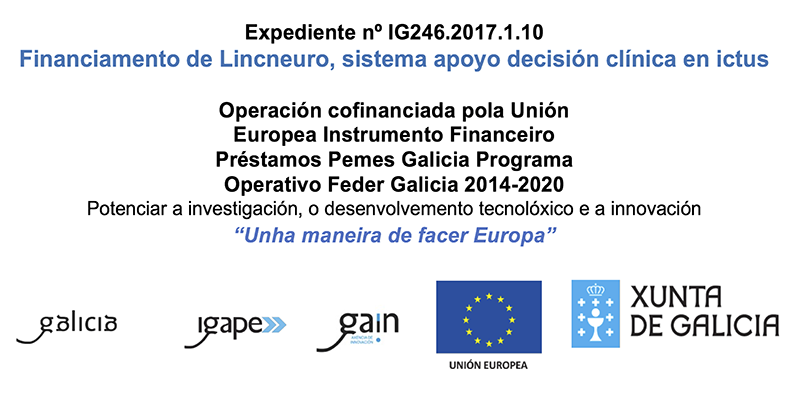
Parque Tecnológico de Galicia
Ed. Tecnópole 1, 32900
San Cibrao das Viñas, Ourense
+34 988 980 631
Avenida Mestre Mateo 2, 15706
Santiago de Compostela (A Coruña)
+34 988 980 631
Enter you email to join us in this marvelous trip.